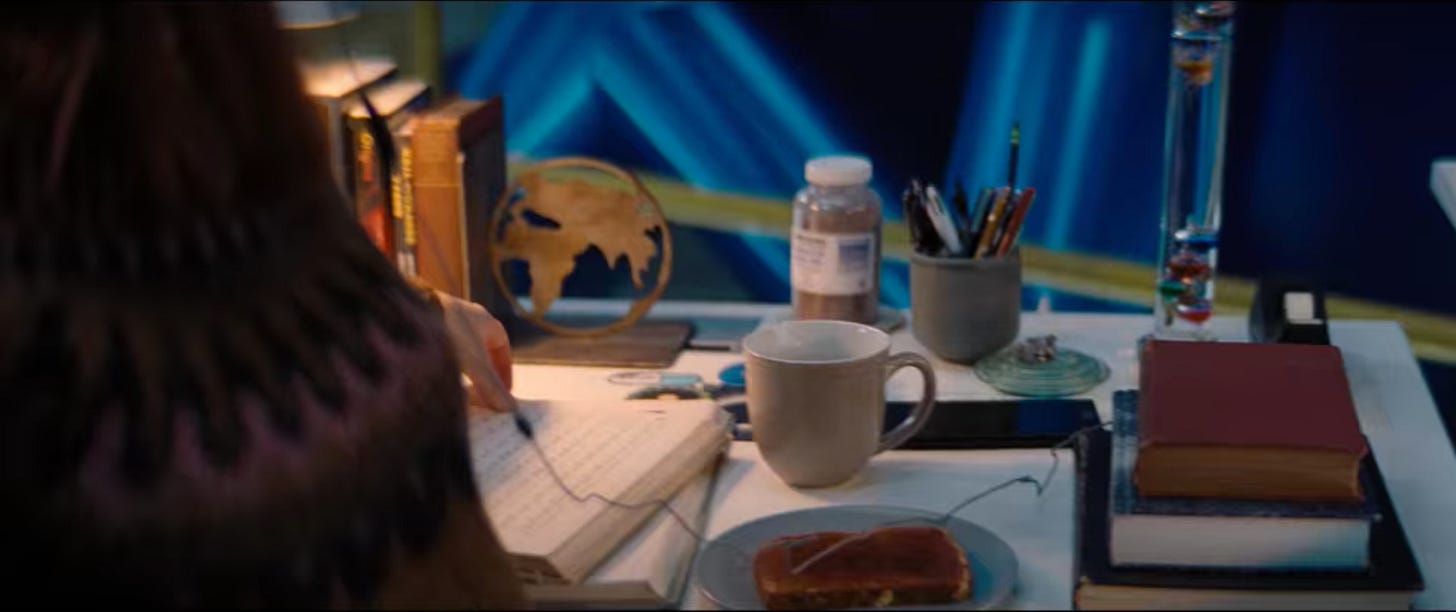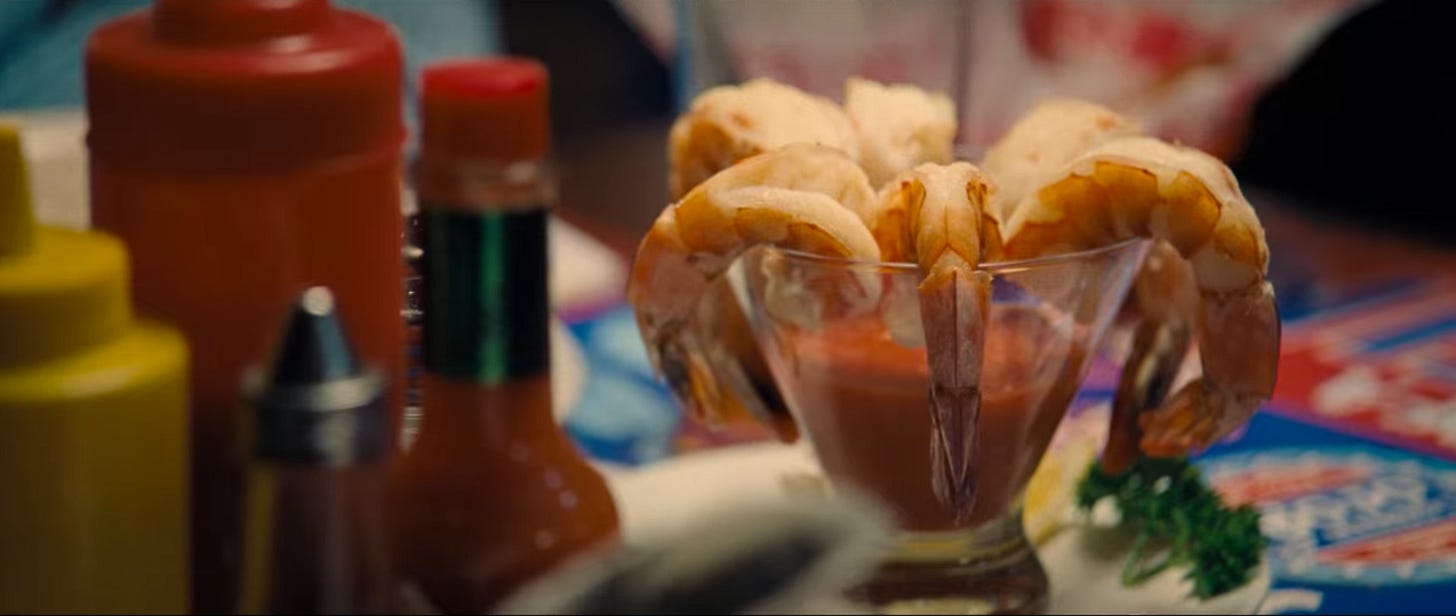SHORT TAKES
AZOR is a Bottega Veneta-like bag of political intrigue and unflashy thrills. (streaming on Mubi)
THE LOVEBIRDS is amiable background fodder despite the romantic je ne sais quoi missing from the pairing of Issa Rae and Kumail Nanjiani.
Denizens of an inner city nabe are deprioritized, ignored, and scapegoated for crimes in ATTACK THE BLOCK, an earnest pre-teen monster movie (that also has a comet) which shouts loud and clear, amid the shenanigans of hide-and-seek bash-a-mole with alien, that ACAB even in England.
As it happens, the new Netflix movie Don’t Look Up opens with a breakfast scene. A steady stream of hot water poured into a mug of tea, followed by a hand slathering jam onto toast, multigrain it looks like. The scene foregrounds the routineness of a normal morning for PhD candidate Kate (Jennifer Lawrence) who makes breakfast on this day, which is just like any other day, until it isn’t. In mere minutes, she and her professor played by Leonardo DiCaprio will discover that a comet will effectively wipe out the entire planet. In the six months leading up to the end of the world they find out that no one really cares, not the apathetic public or narcissistic president, at least not until it’s in their best interests.
This “climate change satire” from Adam McKay, whose began his career successes with Anchorman, is studded with marquee names acting their little hearts out as they dither about to the age old tune of “we’re all fucked.” Given this bleak, and, as I believe it as far as the planet is concerned, utter truth, the least that he could’ve done with this movie, about the inevitable catastrophe that humankind waged on itself, is to make it clever or funny. Unfortunately Don’t Look Up is neither.
DiCaprio, like Christian Bale before him, undergoes the uglification process required of a McKay film and comes out an overweight, itchy, anxiety-riddled nerd. Despite not being camera-ready, or “media-trained” as the characters like to keep mentioning, the public gloms onto his rising star and turns him into an unexpected sex symbol (AILF, astronomer I’d like to…). Meanwhile, Lawrence’s Kate is memeified into a pariah for sounding off a candid warning.
It is hard to predict how the American citizens of this movie, ping-ponging back and forth with the news cycle, will react. The movie similarly has a narrative and editing style that mimics the frenzy of the digital age and abuses our attention, like when it forces us to sit through a sloppy original song unworthy of even the worst college sketch group, called “Just Look Up,” in its entirety performed by Arianna Grande. The song is part of the protest against the president’s new campaign movement— #dontlookup, literally, at the sky in defiance of the impending doom and truth. (Someone eventually catches sight of it.)
This—the foundational joke of the movie—is glib and insipid. After a punchy explainer about the mortgage crisis (The Big Short) followed by a sermonizing one about the sins of Dick Cheney (Vice), McKay has saddled even higher on his horse with this flippant concoction that trivializes and condescends on his own constituents and turns away disbelievers. Rather than excavate politics, he paints with broad strokes hoping hobbled caricatures can stand in for observation.
Meryl Streep plays the reality-star-turned president, and Jonah Hill her failson. Mark Rylance graces us with a soft-spoken performance as a Big Tech overlord with a god complex (his second after Ready Player One) who wants to mine the comet for material gain. There’s also Cate Blanchett, rather brilliantly unrecognizable as a popular morning talk show host, and Timothee Chalamet as an evangelical-skateboarder/fringe-outcast who believes the hard facts and science. We all contain multitudes, I guess.
The blitheness with which McKay approaches his noble pet subjects is not unlike Kendall Roy’s dedication to performing rap songs in Succession, which McKay also produces. Both are cringey but well-intentioned displays of admiration from a studied advocate who doesn’t realize he’s coming across as an asshole.
McKay’s smug approach even extends to smallest details like the food, which is brandished with something like hasty disregard. Like the best set dressing, food in film can convey context, but here the effects are staid (and of course never appetizing), to the point where they’re almost unexceptional. Almost. The camera goes through the motions, and the pannign glimpses of food feel blithley inert and random.
A cart of raw steaks and bundles of rosemary rolled through the tv studio, where the astronomers make their debut, is meant to demonstrate the glamorous extravagance of the media elite. (Blanchett’s character prefers to shield herself in ignorance despite formidable intelligence, and her highest priority is dining at nice restaurants.) Food in this world is an empty perversion of the rich and apathetic.
The steaks are also meant to contrast directly with the over-scrambled eggs that are simultaneously being prepared by the astronomer’s wife (Melanie Lynskey) in the Midwest as she sits down with her sons to watch the show. But any such nuances are slapdash and executed without concern. It’s what makes the opening scene, that humble toast at work, seem so hokey. By the time the random shot of some shrimp cocktail comes up two-thirds of the way through, you know that no one cares.
As the end draws nigh, the central characters choose to spend their last hours over dinner while the fate of the country is presided over by idiots. The last supper gleams with all the fixings, but it’s hard of course to empathize. Their innocuous banter over store bought pie vs homemade rings hollow. The scene is meant to tout quality time but comes up empty, food used again as a prop. The same hopefully cannot be said about our dinners and parties as we ring in the New Year.












Not fault to Chalamet, but that grace at the last dinner did not pull things together the way McKay thought it would. Overall just not empty enough to be any fun.